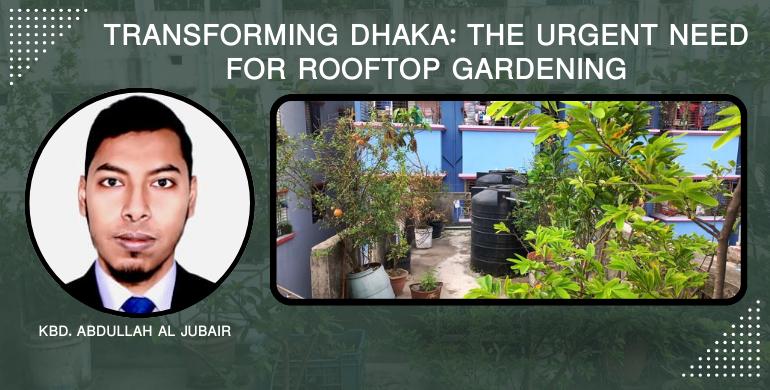
Kbd. ABDULLAH AL JUBAIR: In Dhaka city, there are a huge number of construction projects going on, such as the Metro Rail and other multi-story buildings. However, many of these projects have been completed by sacrificing numerous trees. Consequently, the city is becoming unlivable day by day. The temperature is rising, and the scorching sunlight is causing serious health issues among the citizens of Dhaka. Trees can help tackle the extra heat and purify the toxic air of the city. However, the lack of trees now causes significant air pollution.
Fortunately, there is also a growing opportunity for rooftop gardening. The vast number of commercial spaces and multi-story buildings have created a significant space for rooftop gardening. However, few have taken the step to fill the rooftop spaces with greenery. Rooftop gardens look good, offer great views, and provide a smart and quick way to enjoy a quiet retreat in the heart of Dhaka. Countries such as France, Switzerland, and Canada have all passed laws regulating and demanding that all new commercial and residential buildings have at least a partially green rooftop.
Rooftop gardening can help improve adults' mental health and physical fitness. It provides contact with nature in a city where that has become a bit of a luxury, such as in crowded Dhaka. According to a study by the University of Exeter Medical School, having regular contact with nature and green spaces in urban areas can help keep you mentally healthy and aid with overall happiness. Rooftop gardening also helps improve physical fitness. In modern Dhaka, there is a lack of ground fields for exercises and walking. However, rooftop gardening can offer an amazing solution. Taking care of trees and watering can help elderly people engage in physical activity.
Additionally, rooftop gardening contributes to the reduction and filtering of polluted air particles and gases, not only through the plants and the photosynthesis process but also by deposition in the growing space. Green roofs may also help reduce the distribution of dust in the air and the production of smog, which leads to decreased greenhouse emissions in Dhaka city.
Rain is free water and energy we get from the environment, and rooftop gardens are perfect for making the most of it. Plants on green roofs can use the rain immediately, and sometimes the excess is stored for later use. Rooftop plantations not only retain rainwater but also help to moderate its temperature, acting as natural filters for any water that runs off the building.
The most impressive benefit of rooftop gardens is that they can positively affect the Urban Heat Island (UHI) effect. The UHI concept is based on the increased temperature level found in most urban cities because the sun warms up concrete faster than it does plants and trees. In Dhaka, where there is an abundance of concrete, the city becomes a big hot-aired area all year round. This makes Dhaka extremely hot in summer, leading to an increased use of air conditioners and other cooling technologies. This harmful effect decreases with more green spaces incorporated on rooftops.
Rooftop gardens can also lead to less and more effective use of energy. They offer great insulation, retaining heat in winter and keeping temperatures cool in summer. Rooftop gardens can provide Dhaka's people with urban farming opportunities. It can become a miniature farm that provides fresh fruits, vegetables, and medicinal plants. Additionally, rooftop gardening can create a better ecosystem for plants, birds, and invertebrates. Birds can rest and find their food in rooftop gardens.
In Dhaka, there are now many nurseries available for purchasing plants for gardening. Additionally, Dhaka North and Dhaka South City Corporations can take the initiative to make rooftop gardening popular among the citizens. Many residents and property owners may not be aware of the benefits of rooftop gardening in Dhaka. Public awareness campaigns, workshops, and training programs can educate people about the advantages of rooftop gardens and provide them with the knowledge and skills needed to start their own. Collaboration with local schools, universities, community organizations, and gardening clubs can help spread information and build a network of support for more rooftop gardens in Dhaka city.
Writer: Plant Pathologist, former President of SAUJA
























